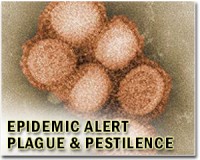| . |  |
. |
Paris (AFP) June 4, 2010 The World Health Organisation's handling of the swine flu pandemic was deeply marred by secrecy and conflict of interest with drug companies, a top medical journal said Friday. The British Medical Journal (BMJ) found that WHO guidelines on the use of antiviral drugs were prepared by experts who had received consulting fees from the top two manufacturers of these drugs, Roche and GlaxoSmithKline (GSK). In apparent violation of its own rules, the WHO did not publicly disclose these conflicts when the guidelines were drawn up in 2004, according to the report, jointly authored by the London-based non-profit Bureau of Investigative Journalism. A draft assessment prepared for the Council of Europe, also released Friday, likewise lambasts the WHO for lack of transparency, wasting huge sums of public money and provoking "unjustified fears". It also points to potential health risks stemming from the "fast track" manufacture of vaccines. WHO decisions led governments worldwide to stockpile vast quantities of antivirals, and its decision to declare a pandemic in June 2009 triggered the purchase of billion of dollars worth of hastily manufactured vaccines. Much of these stocks have gone unused because the pandemic turned out to be far less lethal than some experts feared, fueling suspicion that Big Pharma exerted undue influence on WHO decisions. The BMJ report also reveals that at least one expert on the secret, 16-member "emergency committee" formed last year to advise the WHO on whether and when to declare a pandemic received payment during 2009 from GSK. Announcing that swine flu had become a global pandemic automatically triggered latent contracts for vaccine manufacture with half-a-dozen major pharmaceutical companies, including GSK. "If authors of WHO guidance which promoted the use of certain drugs were being paid at the same time by the makers of those drugs ... that is reprehensible and should be condemned in the strongest possible terms," Chris Del Mar, a member of the WHO's Strategic Advisory Group of Experts on Immunisation, was quoted as saying in the BMJ report. The WHO has refused to identify committee members, arguing that they must be shielded from industry pressure. On Thursday, WHO head Margaret Chan announced -- based on recommendations from the emergency committee -- that the pandemic-level alert would be kept in place despite mounting expectations of a downgrade. While outbreaks have largely disappeared in the northern hemisphere, new cases of A(H1N1) influenza were expected in the coming weeks south of the equator, she said. "The WHO's credibility has been badly damaged," BMJ editor Fiona Godlee commented in an editorial. To repair that damage, the global health body must reveal the membership and any conflicts of interest of its emergency committee, and develop "stricter rules of engagement with industry that keep commercial influence away from its decision making," she said. A WHO spokesman responded to the BMJ report in general terms, but did not comment on the committee set up last year. "Declarations of interest are submitted by all experts who attend WHO expert committee meetings, these were requested at meetings going back as far as we know into the dim and distant past," said Gregory Haertl. In April, WHO formed its own panel of outside experts to probe accusations that the agency had overreacted or was tainted by commercial interests. This report should be finished and released "without delay or defensive comment," Godless said. The Council of Europe assessment, prepared by British Labour Party deputy Paul Flynn, will be reviewed in plenary session toward the end of the month.
Share This Article With Planet Earth
Related Links Epidemics on Earth - Bird Flu, HIV/AIDS, Ebola
 WHO keeps swine flu pandemic alert
WHO keeps swine flu pandemic alertGeneva (AFP) June 3, 2010 World Health Organisation chief Margaret Chan on Thursday decided to maintain a pandemic alert nearly a year after she placed the world on maximum readiness for the new swine flu virus. The WHO said following advice from a panel of scientists that although the outbreak had declined, cases of A(H1N1) influenza were expected to continue in the coming weeks mainly during the southern hemisphere ... read more |
|
| The content herein, unless otherwise known to be public domain, are Copyright 1995-2010 - SpaceDaily. AFP and UPI Wire Stories are copyright Agence France-Presse and United Press International. ESA Portal Reports are copyright European Space Agency. All NASA sourced material is public domain. Additional copyrights may apply in whole or part to other bona fide parties. Advertising does not imply endorsement,agreement or approval of any opinions, statements or information provided by SpaceDaily on any Web page published or hosted by SpaceDaily. Privacy Statement |